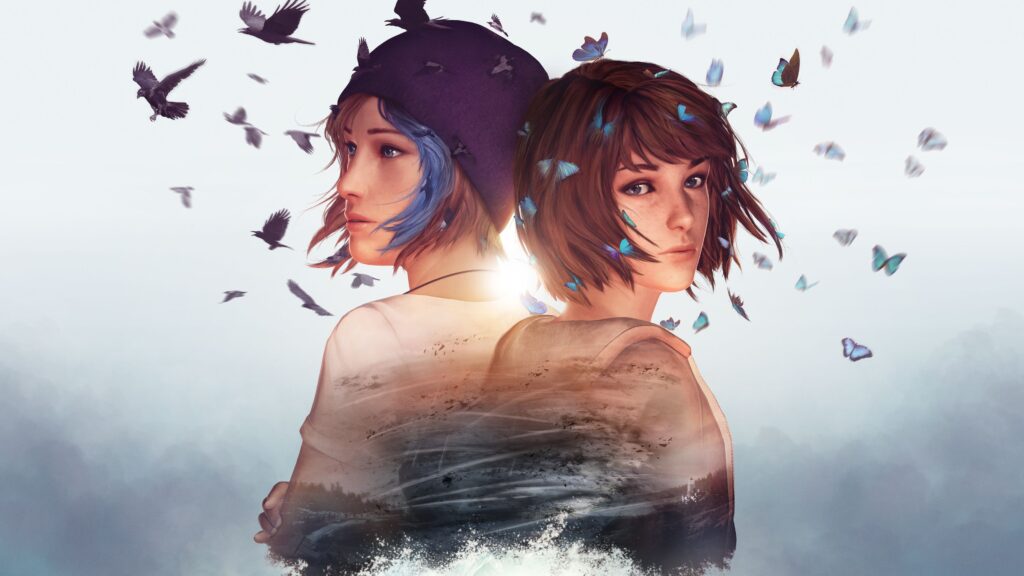
Every year in June, people all over the world come together to uplift marginalized communities that have historically been discriminated against based on their sexual orientation and gender identity defying heteronormative traditions.
While there are many significant contributions from the LGBTQ+ community in a variety of sectors that benefit society, they have been truly indispensable in the development of culture and the arts. Seeing as video games are often viewed as an art form, it follows that they are one key area in which those seeking to celebrate Pride Month will find a healthy amount of representation.
In this article, we will share some of our favorite titles that include a wide variety of LGBTQ+ friendly themes. Our list primarily focuses on characters who have undergone transition away from their assigned gender at birth, characters who do not identify on the binary gender spectrum and same-sex relationships. We will also avoid spoilers as much as possible, as in some cases detailed knowledge of these themes may be significant to the overall plot progression of the game.
Table of Contents
12. The House in Fata Morgana
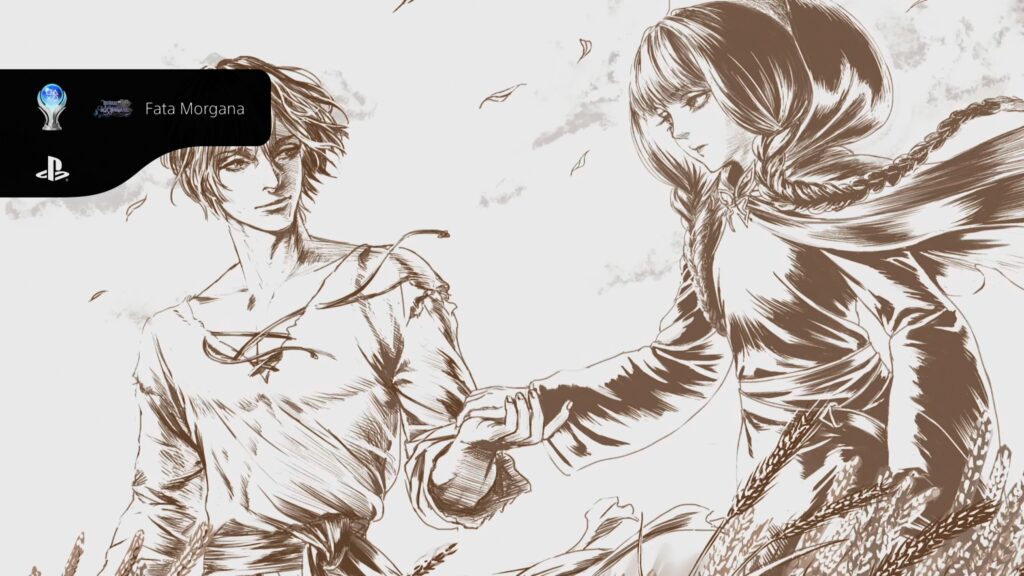
The House in Fata Morgana is an incredibly popular visual novel that has often been cited as the pinnacle of the genre. In this story, you will witness a number of tragedies that have taken place over hundreds of years within the same mansion. It is up to you to piece together the common threads behind each door to discover what could have possibly led to such a depressing series of events recurring over and over again.
While each era’s story differs, common themes include love and loss. It isn’t uncommon for players to be moved to tears by the tales held within these four walls. This holds true the more you can relate to the characters’ individual struggles in an unforgiving world.
For example, one important character in The House in Fata Morgana is unequivocally trans. As you reach the game’s final moments, you will be intimately familiar with this character’s journey as they grapple with their identity and the ramifications soon to come as a result of their transition.
Even better, this character has a meaningful and heartfelt relationship with another person who accepts them for who they are. The House in Fata Morgana makes for a loving character study of a heavily underutilized conflict of which many people can relate.
We are intentionally keeping this character’s name and preferred pronouns under wraps as it is intended to be a surprise for everyone!
The platinum trophy for The House in Fata Morgana is incredibly straightforward to acquire. You simply need to play through the entirety of the game, including nabbing all the endings and checking out some extras in the menu.
11. The MISSING: J.J. Macfield and the Island of Memories
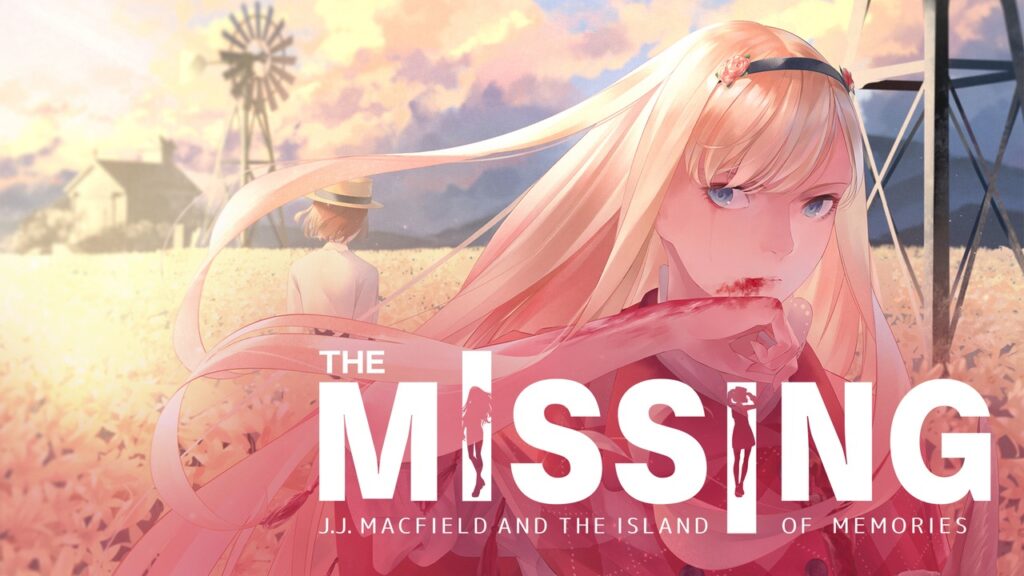
This mouthful of a title doesn’t hold back when it comes to emotional warfare. The MISSING follows the story of a young woman in search of her lost friend. J.J., the story’s protagonist, will stop at nothing to find Emily, up to and including severe harm to herself.
Thankfully, she discovers that she has the innate ability to heal her wounds. This becomes a prominent gameplay feature in The MISSING, as you must balance your degree of injury with the unique platforming puzzles required to progress through the story.
More to the point, The MISSING explores themes related to lesbian relationships, trans identities, and self-harm. Due to the mature nature of the game, discretion is advised as it may be triggering to some players. However, the title approaches these topics respectively and realistically, paving the way for a wholesome message despite its grit.
The MISSING does not have a platinum trophy, however, it does have 20 bronze trophies. These are all fairly straightforward, the most difficult of which likely being “Donut Master.” This trophy requires finding all the collectible donuts scattered across the levels. Although you may need to go out of your way for the achievements, they can all be collected in 5-10 hours.
10. Night in the Woods
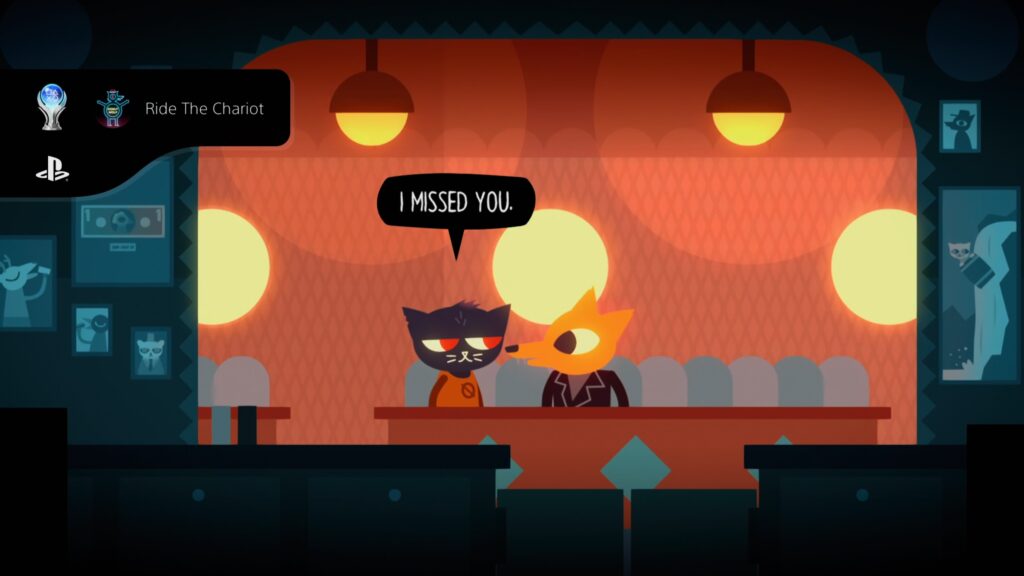
Night in the Woods is a side-scrolling slice-of-life platformer that follows the tale of a homebound college dropout named Mae. Back in Possum Springs, she reconnects with old friends, gets up to trouble, and discovers a terrible secret her old stomping grounds have kept hidden beneath the dated exterior.
Among Mae’s friends are two male characters in a romantic relationship: Gregg and Angus. They have a very secure and healthy dynamic in which Angus is the calm to Gregg’s chaos.
The way Night in the Woods addresses Gregg’s relationship with Angus is incredibly refreshing. It is not treated as anything other than a completely normal sight in their world. If you’re looking for a realistic depiction of a gay relationship between two men that does not center on conflict derived from a hostile society, this game has a lot of positives.
In addition, Mae’s sexuality is also not in question. At one point in the game, she makes it clear that she doesn’t care what gender her prospective partner happens to be. Although she doesn’t date anyone during the adventure, she gets incredibly close to her female friend, Bea. Their interactions could be read as hinging toward something more than just friends.
The trophy hunting experience for Night in the Woods is not one to be trifled with. Among other things, you have to fully complete all drawings in Mae’s journal. That means you have to do everything in the game along both Gregg and Bea’s routes.
Crimes? Crimes.
9. Life is Strange
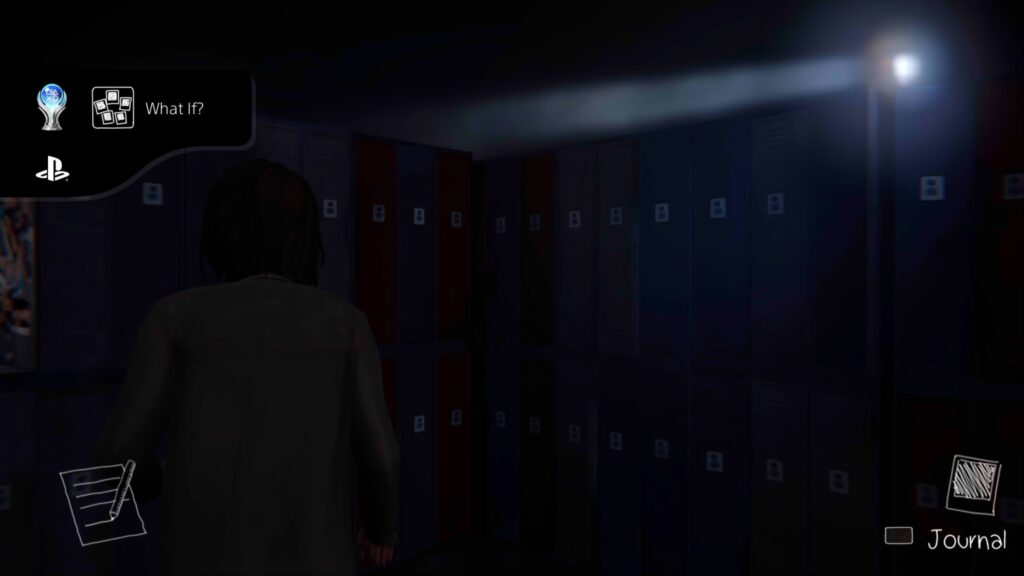
The Life is Strange series is probably one of the most famous examples of LGBTQ+ representation in video games. Max Caulfield, a teenage girl, returns to her old hometown after moving away to the big city. A lot has changed in Arcadia Bay over the years, not least of which being her childhood friend, Chloe Price. The sweet, innocent girl she’d known back then is now a punk rock hellraiser. And she’s “hella” cute.
At the core of its mechanics, Life is Strange is a choice-based game. That means it is entirely up to the player to determine how close Max gets to her friends. One possible path sees Max and Chloe become a couple, overcoming countless adversities and near-death experiences to maintain their connection.
The first game in the series isn’t the only one to include significant LGBTQ+ themes. The prequel story, Before the Storm, follows Chloe’s descent into rulebreaking as she gets mixed up with another girl’s antics. Life is Strange 2, a familial story following two brothers on the run, also has the option to initiate a relationship with another man. True Colors once again brings back sapphic romance, as you can date another female character.
While I have not yet played the latest entry in the series, Double Exposure, it is my understanding that it features yet another sapphic relationship with returning character Max Caulfield.
You really can’t go wrong with this series if you’re looking for unique love stories. There is a very good reason that it is such a well-known icon in the space.
Trophy hunters need not worry about difficult achievement requirements. All of the Life is Strange games are incredibly straightforward to complete. At most, you may need a short guide to find a handful of collectibles in the world.
8. Master Detective Archives: Rain Code
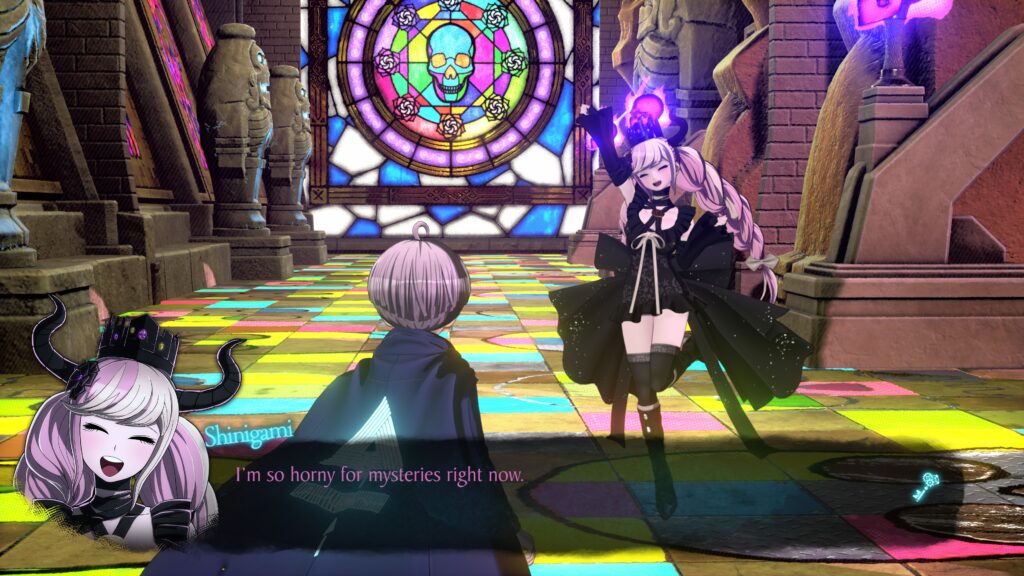
I wavered on whether or not to include Master Detective Archives: Rain Code on this list. Ultimately, I think it is worth mentioning with a disclaimer.
While the game’s pervasive, weak treatment of women in its writing leaves a lot to be desired, it did do one thing remarkably well so far as LGBTQ+ representation is concerned. Given that this identity is often overlooked in media, it wouldn’t sit right with me not to mention its inclusion here.
In this title, you play a young apprentice detective as he unravels an earth-shattering conspiracy in perpetually rainy Kanai Ward. You must make use of a slew of supernatural abilities to solve zany murder cases, all while honing in on a larger truth.
One of the major characters in Master Detective Archives: Rain Code is nonbinary, with their gender expressly unspecified throughout the entire game. Halara Nightmare is an incredibly cool detective, often putting the rest of the cast to shame with their innate abilities and spot-on intuition.
The game takes care not to misgender Halara, nor to sexualize them as was often the case for female characters. Their preferred pronouns were always respected, and although the protagonist did wonder about their gender identity, it was approached in a fairly civil manner.
As stated above, the game has a lot of issues. Although I’ve always been a Danganronpa fan (the very same developers), I generally only find enjoyment in these titles by managing to look past the unpleasant aspects that bothered me.
It was more difficult to follow this philosophy with Master Detective Archives: Rain Code as it was far more persistent in its contrivances, but I’m still glad I got to see a genuine attempt at representing more diverse identities.
Trophy hunting in Master Detective Archives: Rain Code isn’t too difficult. It requires a bit of grinding, as you need enough experience to fully complete your skill tree. Additionally, you must earn the top rank for each murder case, which can be difficult to do on a first pass. Lastly, you need to find a plethora of collectibles in the overworld, but this is simple enough to do with a guide and chapter select functionality.
7. Signalis

This isn’t the first time we’ve discussed Signalis on this website. Signalis is a survival horror title that harkens back to major genre juggernauts of years past, like Resident Evil and Silent Hill.
Its art style is reminiscent of original PlayStation games from the early 2000s but with a brand-new coat of paint. More importantly, Signalis has received significant accolades from fans and critics alike due to its immersive storytelling.
For our purposes in this article, we will turn our attention toward the protagonist’s driving force in the story. Elster, a Replika android in a futuristic world, intends to keep a very important promise she’d made long ago to a loved one. This person is none other than the one she holds dear: another woman named Ariane.
This tragic love story is masterfully weaved through a more familiar horror experience. The juxtaposition of such intense feelings on opposite ends of the spectrum means it wouldn’t be unusual to see players both unnerved and crying in the same session.
It follows then that Elster and Ariane’s relationship has garnered a dedicated fanbase. Seeing as the horror genre is well-known for its irreverence to political correctness (to theoretically better serve spooky thrills), it can lead to some surprisingly progressive moves. In this case, it made way for a very cute lesbian couple that players just want to see achieve happiness.
The journey to acquire Signalis’ platinum trophy is far more relaxing than its intense story beats would have you believe. You can actually earn all of its achievements in one playthrough, so long as you opt for the harder difficulty and keep your eyes out for a few missable items.
While I personally earned the platinum trophy with just shy of 10 hours of playtime, I chose to experience the game completely blind for my initial playthrough. If you try to get everything done in one run, you should have no issues completing the game in under 5 hours.
6. Crymachina
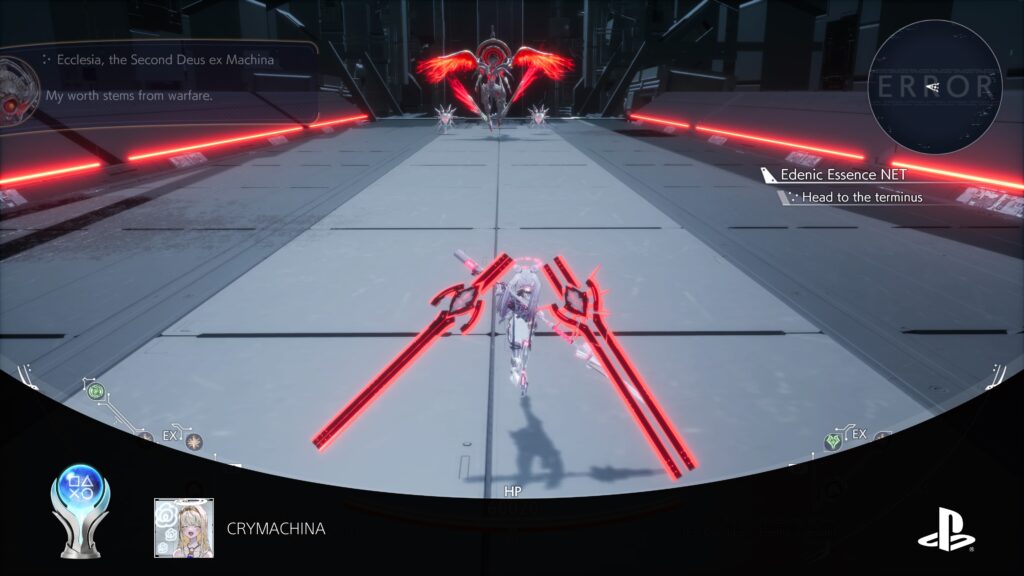
What does it mean to be human? Can one’s chosen family reach the same depth of feeling as a bond derived from blood? Can we still love and be loved, even if we’re not who we think we are?
All these questions and more are posed by Crymachina. Despite an arguably simplistic battle system steeped in classic hack-and-slash gameplay, the narrative does not pull its punches. In fact, the complex relationships between all the major characters are one of the best parts of the game.
Crymachina tells the story of three mechanical women (and their adorable navigator) who must work together to achieve their ultimate goal: becoming human. The cast is comprised of three E.V.E. fighters named Leben, Mikoto, and Ami, plus their guide, the Eighth Deus ex Machina known as Enoa.
Despite their decidedly inhuman identities, the group grows closer and eventually views each other as no different than precious family members. So much so, that their relationships strongly suggest deeper connections.
Ami, for one, is deeply attached to Mikoto. She absolutely adores the other girl and isn’t shy about saying so. The couple share significant screen time, even leading to significant story developments driven by their depth of feeling. As time passes, Leben and Enoa also share several romantic moments together.
Although much of this content takes place in optional conversations in the game’s hideout, these relationships also have incredible influence on the game’s overall narrative. In other words, these sapphic pairings are not just fancy window-dressing; they impact the story in tangible ways.
Earning Crymachina’s platinum trophy will take a bit more work than some of the other titles on this list. After beating the main story scenario, you have to participate in the post-game to reach at least level 99 while defeating a series of secret bosses. But it’ll all be worth it for that sickly sweet platinum trophy icon with Enoa’s glowing smile. That’s worth a gold star!
5. Bugsnax
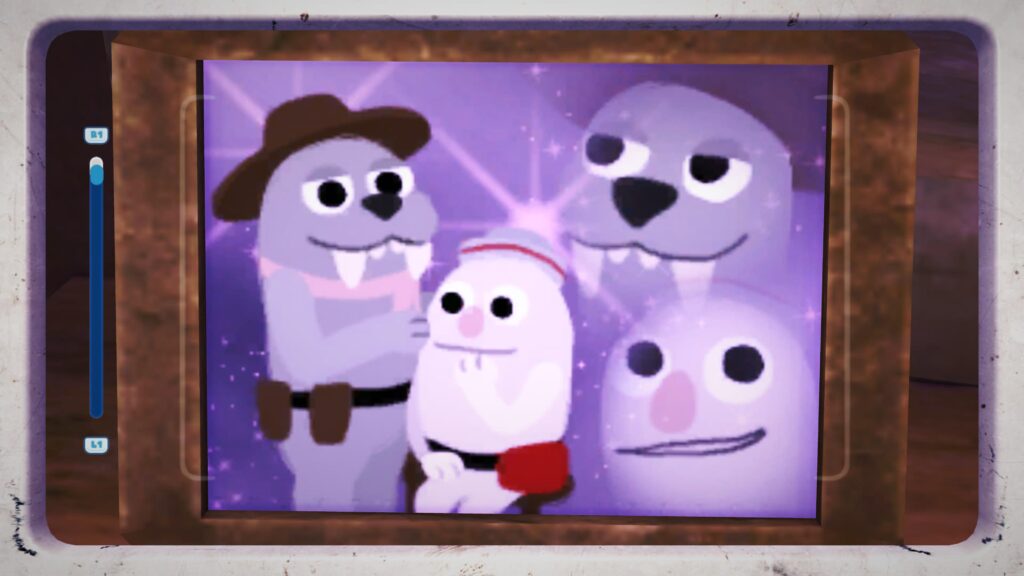
Bugsnax is one of the biggest sleeper hits of the PlayStation 5 generation of games. In this game, you are a journalist tasked with reporting on a very curious phenomenon: an island full of living food. However, the famed explorer you expected to interview on Snaktooth Island has gone missing. It’s up to you to find out what happened to Elizabert.
Not only is the title adorable, but it is also simple, unfiltered fun. While some players may criticize Bugsnax for being nonsensically “weird,” it’s that very same nature that led to some of the funniest moments I had the joy of experiencing in 2020.
Who could have guessed that a walking, talking burger could capture our hearts?
One thing that might surprise uninformed players is just how progressive the game is in its presentation and writing. Bugsnax has many examples of positive representations of queer identities, including gay and lesbian relationships and nonbinary characters.
The famed explorer Elizabert is in a serious relationship with Eggabell, a Grumpus who practices medicine. Although they butted heads at times, this was primarily due to Eggabell not wanting Elizabert to get hurt from her daredevil tendencies. The above photo is part of the furnishings in their shared home on Snaktooth Island.
Yet another duo on the island is Chandlo and Snorpy. These male Grumpuses don’t share much in common on the surface. Chandlo is an athletically-minded Grumpus who is wise beyond his years. On the other hand, Snorpy is a paranoid genius who struggles to let anyone in. Despite their differences, they are of the same mind when it comes to their relationship; both Chandlo and Snorpy care deeply about each other and seek to protect their better half, in whatever manner they think is best.
Snorpy’s older sibling, Floofty, is a nonbinary character who prefers they/them pronouns. They are incredibly smart, but share a similar distrust for strangers. They are a self-proclaimed gastroentomologist, with a fixation on advancing science through their research on Bugsnax.
While these three points lend to strong, visible queer-affirming representation, they’re not necessarily the only examples. The developers have stated that they like to think of Wiggle, another Grumpus on Snaktooth Island, as a pansexual character. It isn’t unreasonable to read many other characters as queer in one way or another, even if they’re not explicitly described in such a manner.
I was surprised to learn just how much effort the developers behind Bugsnax put forth in creating an inclusive world that doesn’t overstep. This interview highlighted how much it mattered to Young Horses that they got it right, even down to casting voice talent with each particular character’s gender identity in mind.
I found it especially insightful that the developers expressly avoided any so-called “cis-explainer” scenes. This is just a normal part of life for many people. And that’s exactly the type of representation that is incredibly realistic and beneficial in normalizing LGBTQ+ identities.
The platinum trophy for Bugsnax is very simple to obtain. You need to collect all of the Bugsnax, transform the Grumpuses by feeding them, and perform a few miscellaneous tasks.
The game also received DLC story content that included a brand new area, fully fleshed out with an additional trophy set. Thankfully, the DLC only includes 3 new trophies. These can be earned by completing side quests found in your mailbox after finishing the story scenario.
4. The Last of Us Parts I + II
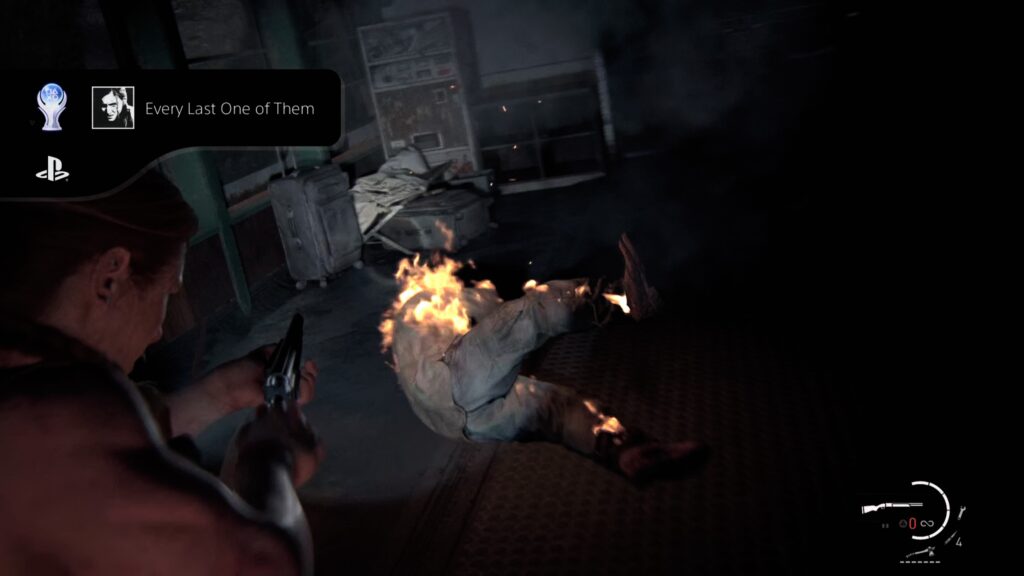
This first-party PlayStation series takes place many years into a world-ending zombie apocalypse. You travel cross-country for various reasons, laying waste to any threat that gets in the way of your goals.
One of the most important characters in the series is Ellie. In The Last of Us Part I, she is a young teenager who holds the key to a potential cure for the zombifying brain fungus. We get a deeper look at who she is in the Left Behind DLC story that takes place before the events of the main game.
In this DLC, Ellie spends time with her female friend, Riley. It plays out just how you’d expect a date at the mall to go, with the caveat that it’s taking place in a post-apocalyptic world. It is a bittersweet tale that explains a lot about the inner workings of Ellie’s character.
Naughty Dog ramps up the LGBTQ+ representation another notch in the sequel. In The Last of Us Part II, Ellie takes an even more prominent role in the story. This time, she is in a committed and fully realized relationship with another woman named Dina. This fact is pivotal to many events that happen later in the story.
Additionally, The Last of Us Part II introduces a trans male character. Lev identifies as a boy and prefers he/him pronouns, in contrast to his assigned gender at birth. His struggle with his family, the cult from which he was born, and the actively hostile zombie world and everything that entails are all paramount to his character.
Lev’s identity is approached in a respectful, yet realistic way. Although conflict occurs as a result of his transition, the protagonist never questions his gender identity.
The trophy hunting experience for The Last of Us vastly depends on which version of the game you choose to play. Generally speaking, the newer you go, the easier it is. The PlayStation 3 and 4 versions of The Last of Us require playing on the hardest difficulties as well as extensive time in the online multiplayer mode.
On the other hand, the recent PlayStation 5 remakes pare down the trophy lists and make them much more reasonable for casual players to earn. Interestingly, the platinum trophy icon design has become more simplistic over time, as if to visually signal this change in philosophy.
3. Baldur’s Gate III
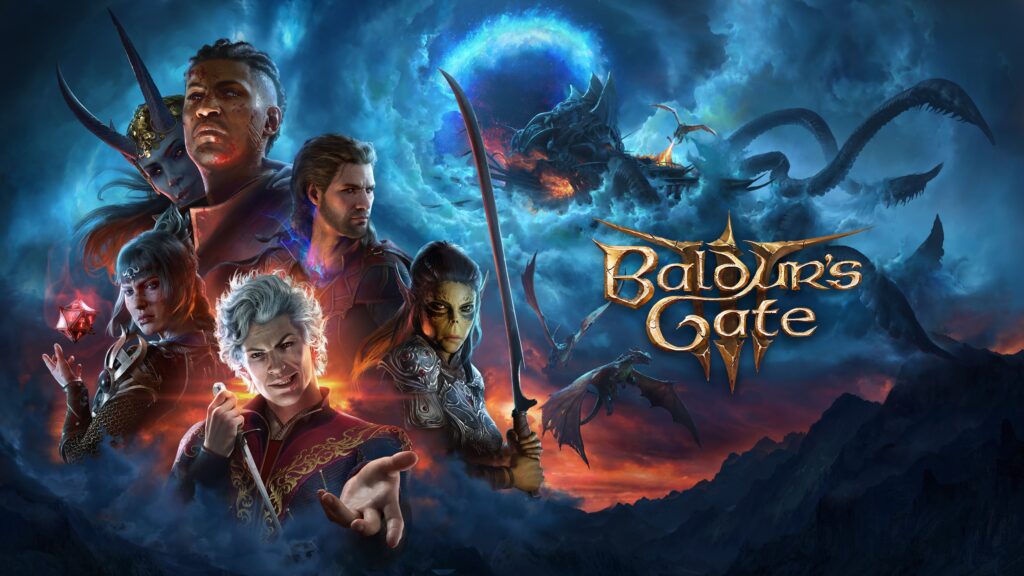
Baldur’s Gate III is the only game on this list that I have yet to play myself. I have every intention to do so eventually, but haven’t gotten around to it yet. Thankfully, I have seen and heard plenty about the game to be confident about including it on a list regarding LGBTQ+ representation.
This title is a tactical RPG that has roots in Dungeons & Dragons. When you make an important choice, you may have to roll a dice to check whether or not you succeed. This leads to an insane amount of diversity in players’ experiences throughout the game, as well as a boost in immersion knowing that your journey is uniquely yours.
Larian Studios carefully crafted the game’s character creator tool to be as inclusive as possible. You can customize your body, voice, and preferred pronouns in any way that you like. That even includes the option to make your character nonbinary with they/them pronouns!
Additionally, the player can initiate relationships with any of the 8 romantic candidates regardless of their own gender identity. All of the potential love interests are functionally pansexual. Not only that, but it is also possible to have a polyamorous relationship with a handful of specific characters.
And that doesn’t even include any organic interactions players may discover while playing through the game’s many side quests, or from simply speaking to any NPCs they run into.
Given all the care that went into making sure Baldur’s Gate III was as inclusive as possible, it absolutely deserves a mention here. When I finally get around to ordering a copy of my own, I’m certain I’ll have a blast.
That said, the trophy set for Baldur’s Gate III is not a joke. You can expect to spend well over 100 hours across two playthroughs of this gargantuan title, one of which must be on the hardest difficulty. The trophy guide on PSN Profiles rates the trophy hunt as a 7/10 difficulty overall. So be prepared for a long, arduous grind for an incredible game that likely deserves it.
2. Cyberpunk 2077
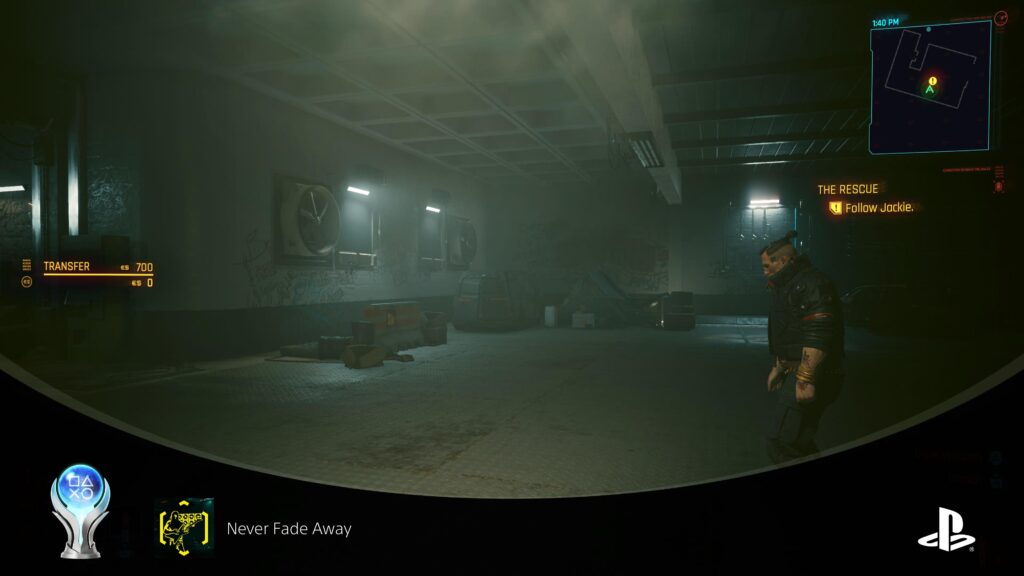
Cyberpunk 2077 is exactly what it says on the tin: a futuristic dystopian world that centers on body modification and not-so-subtle commentary about capitalism. In this game, you play as V, a person who finds themselves suddenly sharing mind-space with a crazed lunatic who has rather colorful ideas about how they should live their life.
In terms of queer representation, Cyberpunk 2077 is a mixed bag. It does some things well and fumbles on others. It’s not difficult to find legitimate criticism about how the title determines the player’s gender, for example.
From my understanding, your gender is flagged based on a combination of your selected body type and whether you select the predominately masculine or feminine voice. This can be jarring, as many people may connect better with one voice, yet not jive with the pronouns that the game automatically ascribes for that selection.
Additionally, V’s gender can make a huge difference in other ways. Cyberpunk 2077 is fairly unique as a video game in that its characters are not “player-sexual”; each romanceable character has a set sexuality that does not flex to suit the player’s gender identity.
In theory, this is a great idea. It’s realistic, as people in real life generally do not change their sexualities on the fly. Plus, this approach has the potential to make any prospective relationship feel more immersive and earned.
Yet, in practice, this game design leads to some issues. For starters, you won’t have any idea who you’ll have chemistry within the game before you’ve started playing.
Unfortunately, Cyberpunk 2077 doesn’t give the option to change your gender during the game, either. It’s a shame, as it seems like something that would be well within the bounds of a cyberpunk future.
The two explicitly queer romances can be achieved with Judy (as female V) and with Kerry (as male V). It’s cool to see characters that are unabashedly under the LGBTQ+ umbrella, yet, it’s a shame that some players get locked out of the option without realizing it.
Personally, I was disappointed I couldn’t see the romance path with Judy, as I had opted for a male V in my playthrough without having done adequate research about what to expect.
As with LGBTQ+ representation, Cyberpunk 2077’s achievement set is also highly dependent on your experience. Although the game has been vastly improved over time with the aid of patches and content updates, it is still possible to encounter bugs and glitches that can lock you out of a trophy.
This is easily evidenced by my platinum trophy screenshot—the very first story mission apparently never unlocked the relevant achievement. So, I had to go back and get it at the end of my run.
In general, you need to see all the endings, find all the collectibles, and take care not to pass up any missable trophies. Cyberpunk 2077 also came out with additional DLC content in the form of Phantom Liberty, which added a new trophy set. Once again, to earn all of these, you need to complete all the endings and fill out your map completely.
1. Undertale
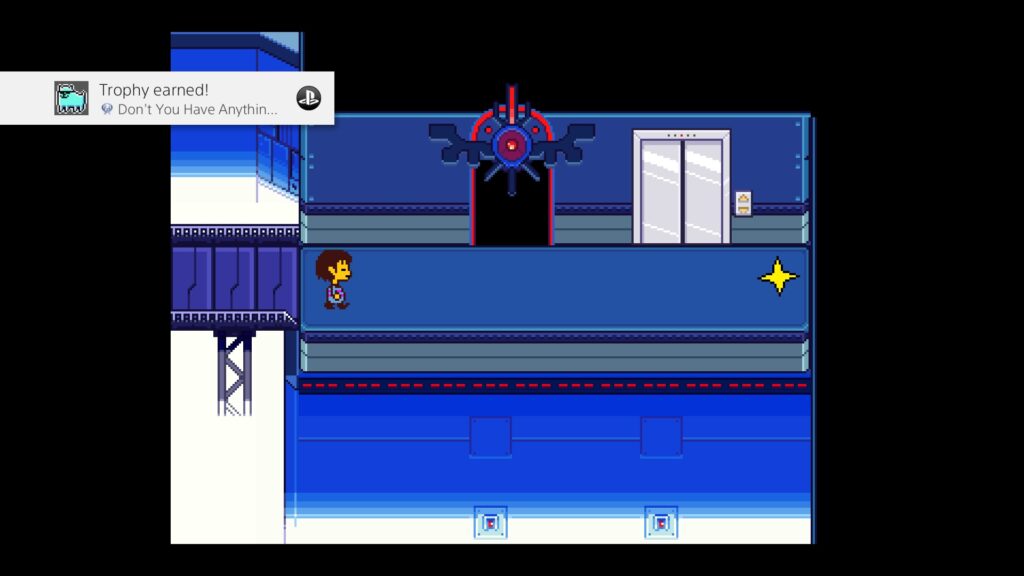
Undertale has had an undeniable impact on gaming culture over the years. In this game, you play as a human child who has unwittingly stumbled into the realm of monsters. You must decide how to deal with the monsters you encounter as you try to find your way back home.
This title is a treasure trove for meaningful LGBTQ+ representation in video games. There are same-sex relationships, trans characters, and nonbinary characters with major roles in the game. Deltarune, the follow-up title for Undertale, also continues to expand on its progressive representation.
Like Bugsnax, these relationships and gender identities are not treated as anything other than completely valid and normal. Given Undertale’s vast reach, I won’t get into as much detail on the finer points here. Many of you may be even more familiar than I am with this one!
For trophy hunters, you can rest easy with Undertale. The achievement set is laughably easy and doesn’t even require completing the game. Just get ready to mash the X button for a few minutes to get through all the required donations at the Dog Shrine.
Conclusion
Pride Month is an excellent opportunity for gamers to learn more about themselves and others. Celebrate your way by earning a platinum trophy in a queer-positive title! Or, consider going all out and tackling the Rainbow Platinum Trophy Challenge.
This list is by no means exhaustive of all meaningful LGBTQ+ representation in gaming. I may have missed some incredible titles simply because I have not encountered them before. Let us know in the comments about any games that you feel have exceptionally positive LGBTQ+ representation!


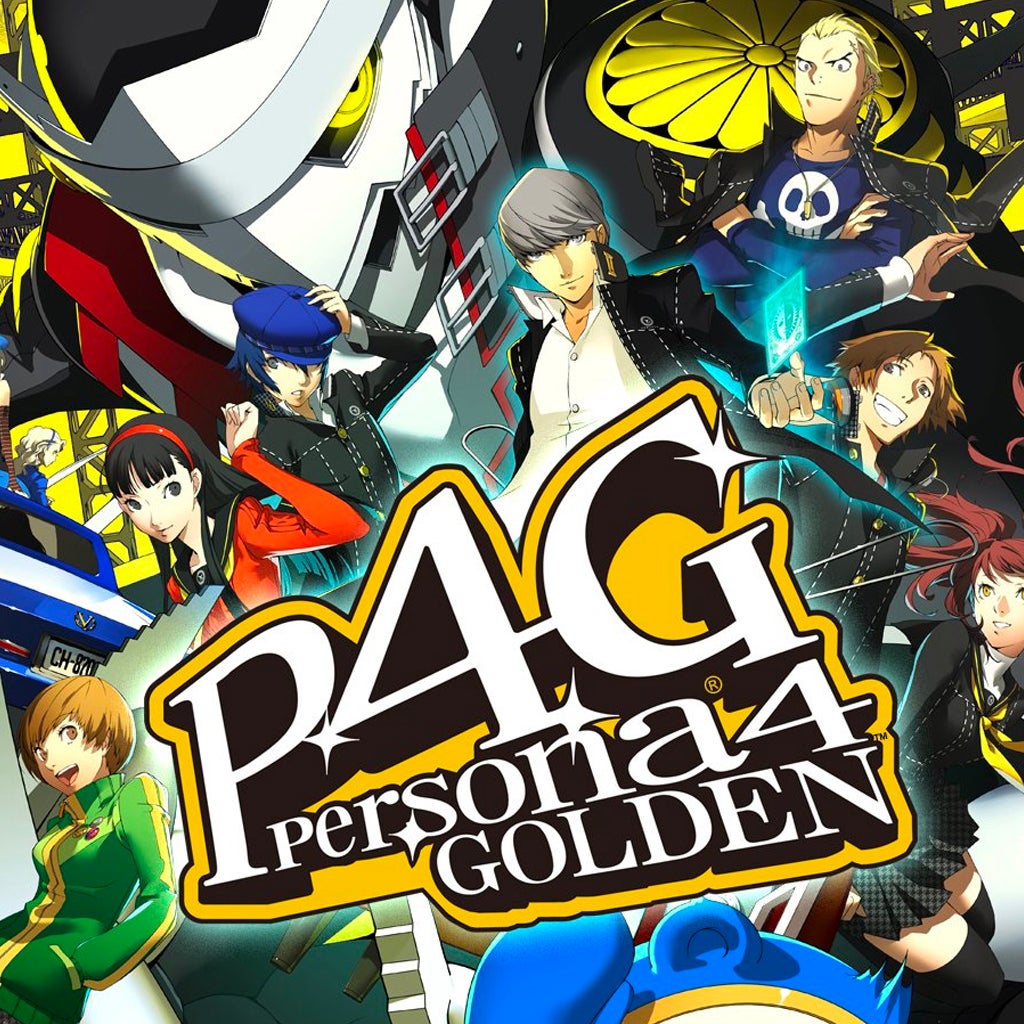
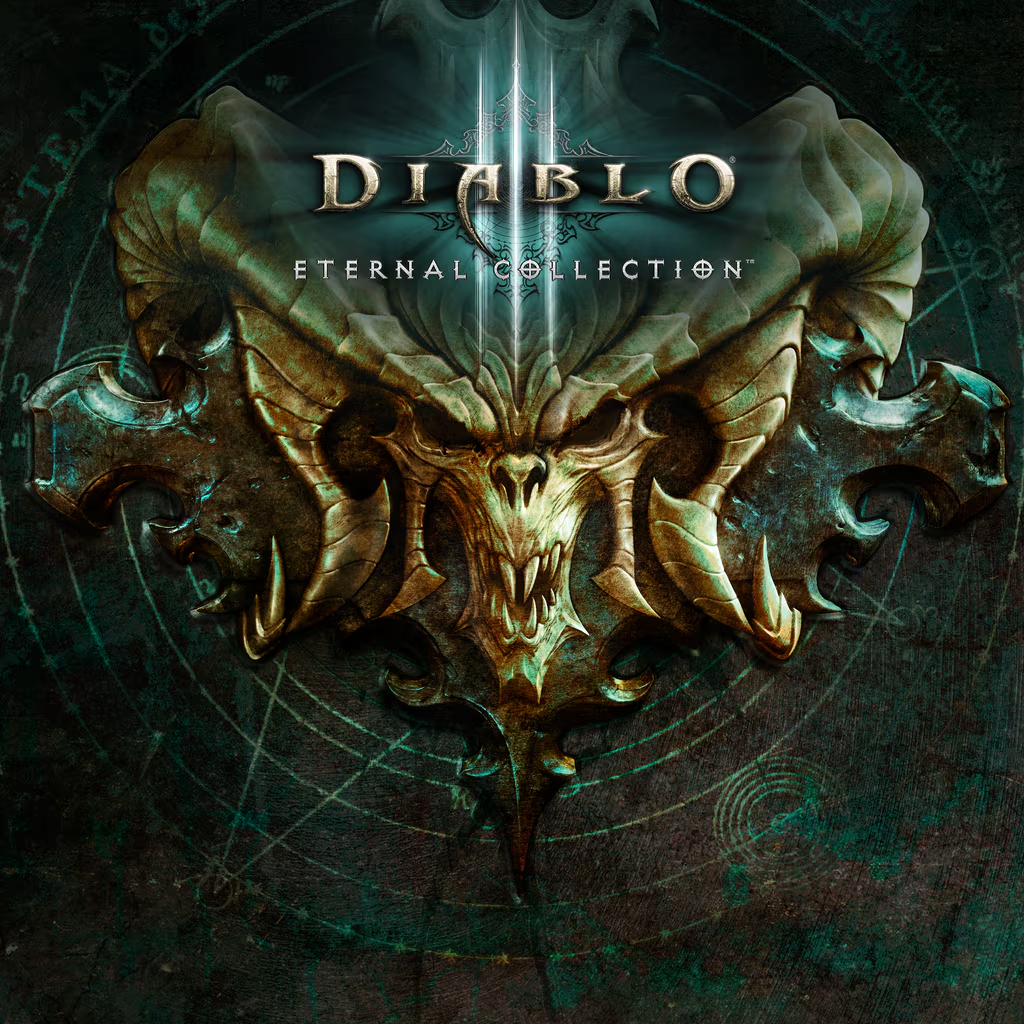
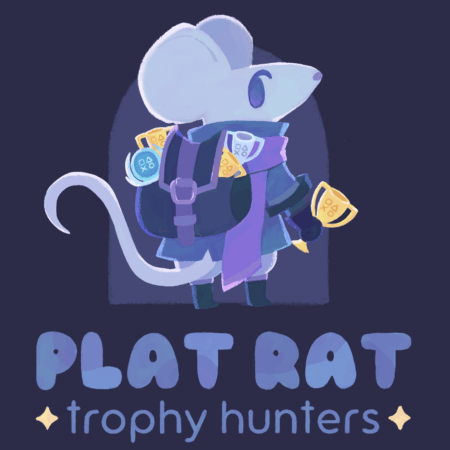
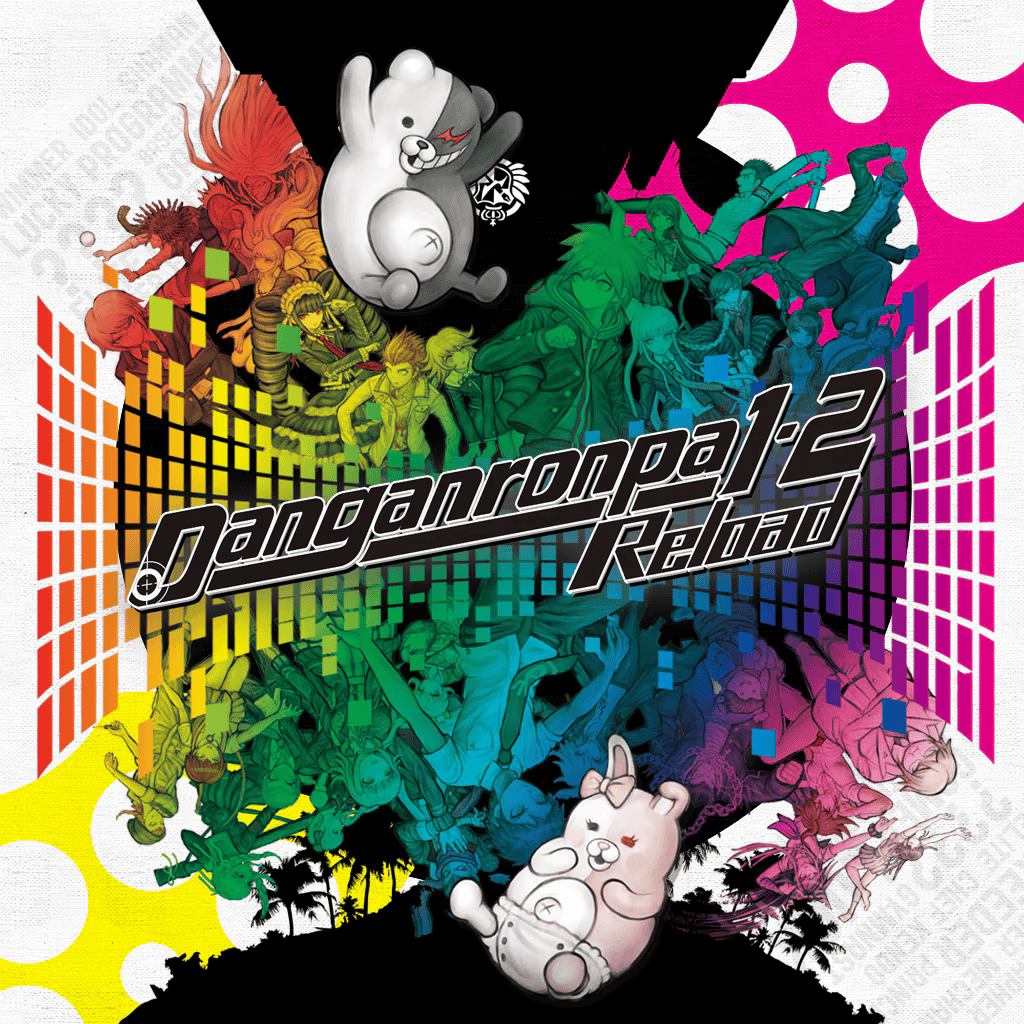
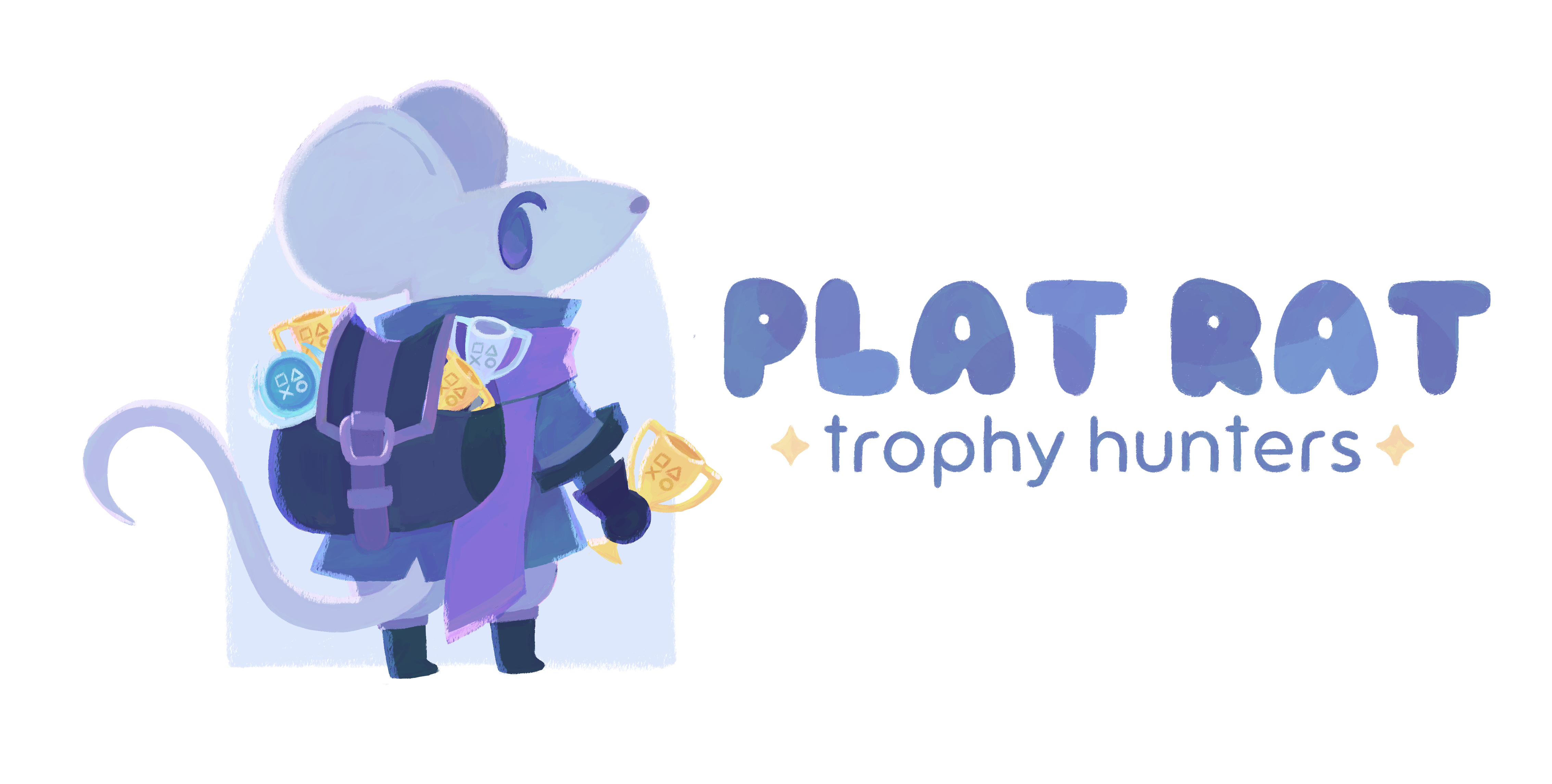
Leave a Reply